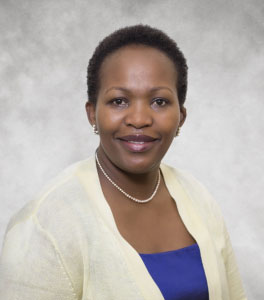Benda Kithaka is a health advocacy and communications specialist.
An alumni of the AORTIC Master Cancer Advocacy Trainer Programme in 2013, her advocacy work includes drafting of the Kenya Cancer Control Strategy (2017–2022), writing the WHO Regional Office for Africa Advocacy For Cervical Cancer Prevention and Control in Africa Facilitator Manual, and training of Expert Trainers of Trainers [ToT] from 10 WHO AFRO Countries in use of its toolkit in Africa (2017).
Benda sits on the ASCO Resource-Stratified Guideline Advisory Group (2018-2020), NCI/Center for Global Health Africa Cancer Research and Control ECHO® Program (2017-2019), the Africa ECHO® Steering Committee (2018-2019), and the AORTIC Advocacy Special Interest Group (2019). In Kenya, she co-chairs the STOP Cervical Cancer Technical Working Group at the National Cancer Control Programme (2018-2019) and participates in the Advocacy, Communications and Social Mobilisation Technical Working Group (ACSM-TWG) at the National Vaccines and Immunisations Programme, Ministry of Health.
She has received various awards, including the Union for International Cancer Control (UICC) award to participate as the civil society voice in the Regional Consultation on the Elimination of Cervical Cancer in the African Region (May 2019), the 2017 American Association for Cancer Education (AACE) Selma Morris Memorial Travel Scholarship Award, and the Cancer Ambassador of the Year 2016 in Kenya by Eddah’s Hope.
In 2012, together with Elizabeth Mbuthia, Catherine Wachira, and Dr. Njoki Njiraini, Benda formed Women4Cancer Early Detection & Treatment, a Kenyan NGO to address the stigma associated with cervical cancer and to focus on cervical cancer prevention and control across the continuum of care. Their team of dedicated volunteers have programmes in policy advocacy, community education, screening, patient navigation, and social reintegration of women cancer survivors. Their partners include the Ministry of Health, County First Ladies Association (CFLA), Kenyan Network of Cancer Organisations (KENCO), and the American Cancer Society.
Benda holds a Post Graduate Diploma in Healthcare Management from the Strathmore Business School Institute of Healthcare Management (2016), Post Graduate Executive Diploma in Advanced Strategy from the University of Cape Town Graduate School of Business (2010), and a Bachelor’s Degree in Political Science (Government and History) from the University of Nairobi (2008).
Prior to co-founding Women4Cancer, Benda worked in corporate Kenya for 15 years. Her advocacy is fueled by the realisation that each of us has been affected by cancer in some way and that we each have a responsibility to help our communities cope with the burden that cancer presents.
About Women4Cancer Early Detection & Treatment
Women4Cancer Early Detection & Treatment is a Kenyan NGO focused on cervical cancer prevention and control across the continuum of care. The organization is committed to the vision of a Kenya free from cervical cancer.
Working together, in 2012, four women— Benda Kithaka, Elizabeth Mbuthia, Catherine Wachira, and Dr. Njoki Njiraini—co-founded Women4Cancer, in part, to address the stigma associated with cervical cancer in their communities. They are actively engaged in creating awareness, conducting screenings, and facilitating navigation for access to treatment for women in rural locations.
Over the past 7 years, Women4Cancer has achieved the following:
- Cancer awareness and education of communities, reaching over 45,000 Kenyans with one-on-one cancer awareness talks held at community meetings and at corporate health talks in urban areas
- Integrated medical camps (facilitated 40 outreaches so far), reaching over 7,500 women in rural Kenya with free screening for cervical and breast and cancer
- Robust navigation programme run by volunteer survivor navigators who make sure that after screening camps, any woman found with results that are suspicious for cervical or breast cancer is not lost to follow-up, but instead accesses quality and timely treatment
- A pilot programme to empower cervical and breast cancer survivors with seed capital to start income-generating activities. (The initial seven women run small- and medium-sized enterprises such as beading, seam-stressing, and small-scale cattle rearing. This ensures that they have the necessary disposable income to continue with the survivor navigation programme.)
- Treatment for precancerous conditions of the cervix and invasive cancers (At least 300 women have either been treated for precancerous conditions of the cervix or for invasive cancers. The youngest woman reached through their programme is 21 years old; she received interventions for precancerous lesions in 2018. The oldest is 76 years old; she was treated for invasive cervical cancer in 2015.)
The organization leadership also engages the Government of Kenya through the Ministry of Health for policy advocacy. Successes in this area of advocacy include the following:
- In the period 2018-2019, Women4Cancer partnered with the Ministry of Health and the National Cancer Institute in Kenya to initiate the first National Cervical Cancer Awareness Week, held in January 2019. This highlighted cervical cancer on the national health agenda, and the advocacy week has been adopted by the Ministry of Health as a National Commemorative Event to be held every year in the national calendar of events.
- Women4Cancer has participated in the Annual Globe-athon to End Women’s Cancers Walk since 2013. In 2019, this event was re-branded as the STOP Cervical Cancer Walk, with national participation in sensitising communities to take charge of their health through preventive measures.
- The leadership sits on various Technical Working Groups where, with other experts, they advise the government on mechanisms to sustain the provision of cervical cancer primary prevention initiatives through HPV vaccine for girls 10 years old and screening for eligible women.
Within the next 5 years, Women4Cancer is committed to leveraging its networks for resource mobilisation to sustain advocacy activities that move government to prioritize cervical cancer prevention through HPV vaccine and early detection, patient navigation for timely access to treatment, and post-treatment reintegration of survivors into communities—all to achieve lasting impact in cervical cancer control in Kenya.
